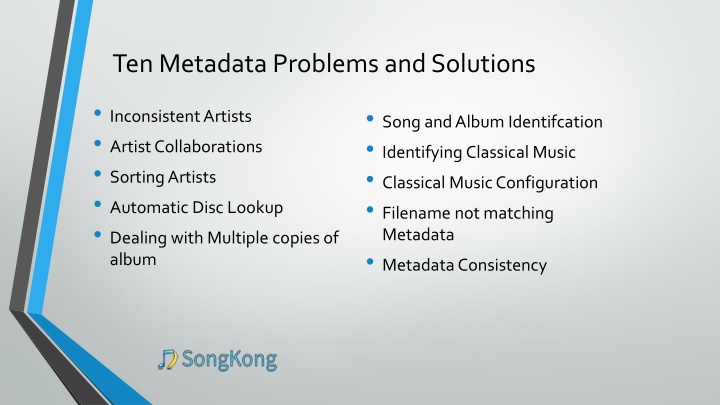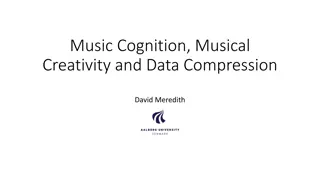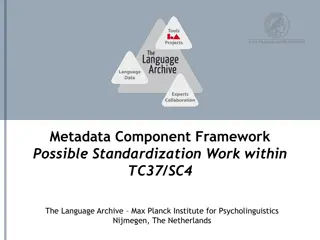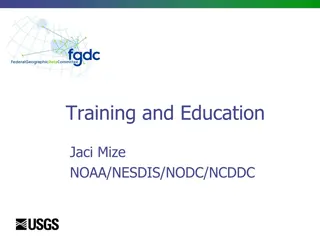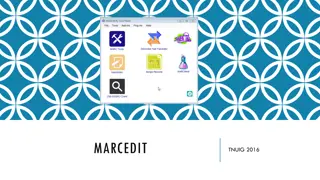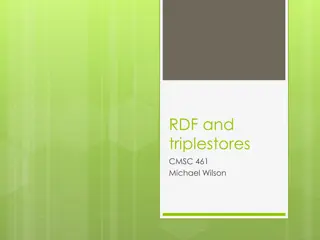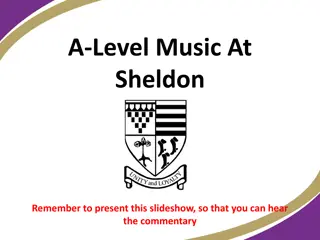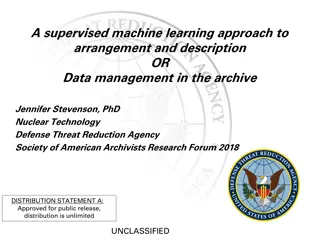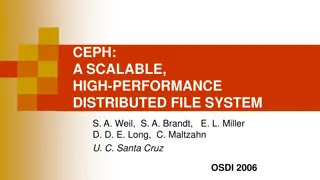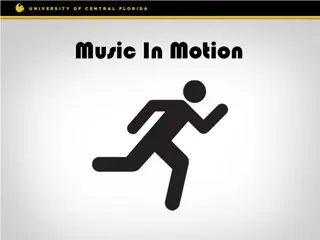Metadata Challenges and Solutions in Music Management
Addressing ten metadata issues in music organization, such as inconsistent artist attributions and sorting discrepancies, with corresponding solutions including entity-based approaches and artist collaboration management. Strategies for improving metadata consistency and optimizing music data retrieval are discussed.
Download Presentation

Please find below an Image/Link to download the presentation.
The content on the website is provided AS IS for your information and personal use only. It may not be sold, licensed, or shared on other websites without obtaining consent from the author.If you encounter any issues during the download, it is possible that the publisher has removed the file from their server.
You are allowed to download the files provided on this website for personal or commercial use, subject to the condition that they are used lawfully. All files are the property of their respective owners.
The content on the website is provided AS IS for your information and personal use only. It may not be sold, licensed, or shared on other websites without obtaining consent from the author.
E N D
Presentation Transcript
Ten Metadata Problems and Solutions Inconsistent Artists Artist Collaborations Sorting Artists Automatic Disc Lookup Dealing with Multiple copies of album Song and Album Identifcation Identifying Classical Music Classical Music Configuration Filename not matching Metadata Metadata Consistency
Problem 1:Inconsistent Artists Artists are not always attributed the same on every release Minor differences in names, such as initials, spelling errors Artist deliberately use different name e.g Prince, O(+>, Formerly Known As Different languages, e.g. / Pyotr Ilyich Tchaikovsky This makes it difficult to find all music by a particular artist Tools that lookup CD do independently of any other CD by same artist, so no consistency Manual Edit, easy to make mistakes and introduce inconsistencies
Solution 1:Inconsistent Artists Understands Artists as entities ( we store an Artist Id we know who they are) Artist Canonical Name, instead of using name on release we can use their main name If their main name is not in Roman script (eg ) we can use their Roman/English version of name
Problem 2:Artist Collaborations Collaborations e.g. Johnny Cash and June Carter Featured artist e.g. Taylor Swift feat. Ed Sheeran So each collaboration, or featured by involving an artist ends up as a separate artist in your browse list
Solution 2: Artist Collaborations Again it comes now to entities, when we lookup it is decoded as Johnny Cash & June Carter So we know we have two artists and a connector, so we can store as Johnny Cash June Carter We can do the same with featured artists, we can also drop the featured artist altogether if they are not of interest.
Problem 3:Sorting Artists Sometimes lookup returns the Artist Sort Name (Beatles, The) rather than their Display Name (The Beatles), another source of inconsistency Sometimes Sort Name are shoe-horned into main name Hard work entering sort names Cannot derive sort names automatically, e.g Josquin des Prez
Solution 3: Sorting Artists Again, artist is an entity, and each entity has a Sort Name We have sort fields for all people/group fields including Artist Album artist Composer Conductor Orchestra Choir Performer Arranger Lyricist Ensemble So you can display as Kate Bush, but sort as Bush, Kate
Problem 4:Automatic Disc Lookup So you rip your CD to server/computer CDs don t store artist, album ectera Tools such as iTunes, dbPoweramp lookup CDs based purely on no of tracks and track lengths Can return totally wrong album with coincidentally same track lengths Total fail for releases with less than five tracks CD based not album based so no consistency over discs in multi disc album Doesn t set Disc No, Disc Total fields because single disc based Sources such as freedb, poor quality Better sources as Gracenote still have errors no, way to fix them.
Solution 4:Automatic Release Lookup We match to Releases not Discs Understands that all files in folder could be multidisc album, and that sub folders likely to represent discs within multidisc album Uses Acoustic Fingerprinting this listens to the music rather than just basing on track lengths on album Works for releases of any lengths i.e. singles. Combine this with existing metadata (including track lengths) and folder structure to ensure it is a valid match. Properly add Disc No, Disc Total and Disc SubTitle fields
Problem 5:Dealing with Multiple Copies If using automatic matching can end up with multiple files with identical metadata Hi-Res and non Hi-Res versions of same album Lossless and lossy version of same album for portable devices Singles and albums may have same name Box Sets, may want to see sub disc titles This causes issue when browsing and searching
Solution 5:Dealing with Multiple Copies Differentiate between Singles , Albums by adding (single, EP) to name Can auto identify hi-res (24bit) albums add add [HD] to album name Can add audio format to album name e.g (flac) Include/exclude disc sub titles from album name
Artist and Release Entities We use MusicBrainz Artist and Release Entities, defacto standard used by Microsoft, Google, BBC, Spotify and last.fm But our database cross references MusicBrainz and Discogs, so we can use MusicBrainz artists even when we have only matched to a Discogs release. The data in MusicBrainz can be easily edited, and there is a full audit trail so if any errors are found they can be fixed properly by anyone.
Problems Handling Classical music Classical music has features that means it needs to be handled differently to Pop/Rock music There is not a single artist, usually comprises conductor, performers and orchestras. The composer is not usually involved with the recording, and may have died long ago ! But most databases and tools have been designed primarily with only Rock/Pop music in mind. Within an Album Movements and Works are as important as Tracks
Problem 6:Identifying Classical Music The major databases do not have a flag to indicate if a release is a Classical release There is inconsistency in how Classical releases are added MusicBrainz supports the extra metadata that Classical releases require but the interface for adding data is poor. Discogs does not provide additional fields to properly capture the additional classical data.
Solution 6:An Algorithm to Identify Classical SongKong uses an advanced algorithm to identify if a release is actually classical, it considers the following to decide if Classical: Known classical composers, conductors and performers Identifying works and movements Known Classical Record Labels Parsing Titles for items such as Opus numbers We also provide an user configurable exception list for those edge cases that are incorrectly categorized.
Problem 7:Configuring Classical Releases What should the artist be set to ? How do we capture information such as the orchestra or soloist performers ? How do we group tracks by works and movements ?
Solution 7: Configuring Classical Releases Because we know the classical release we can then can configure Track Artist differently, e.g as combinations of Performers, Orchestras, Conductors. We can put Composer into their own Composer field, and keep the Album Artist field for the main performers. We properly categorize everyone, we have separate fields for Conductor, Composer, Performer, Orchestra, Choir, Ensemble fields We have Work, Movement, Movement No, Movement Total, Opus, Classical Catalog and even multi level Work fields
SongKong with MinimServer MinimServer is a uPNP server that works on most systems including Melco N1 as an alternative to Twonky We have worked with MinimServer to get the best Classical solution SongKong really well with MinimServer UPnP, because MinimServer can be customised to use any metadata SongKong also support MinimServer Groups, analogous to Works
Problem 8: Album Without MinimServer Group Added Cluttered with repeated information No easy way to play a complete single work
Solution 8: Album after using SongKong to add Group Less cluttered, grouped by work But you can drill down to movements within work
Instruments and other indexes SongKong can add all types of metadata that can be indexed and browsed Includes instrument Includes acoustic metadata such as Bpm, Key and Mood
Problem 9 Filename not matching Metadata If you modify metadata then ideally the filename should reflect the metadata Need a flexible way of creating new filename from metadata But must be careful with breaking playlists And Careful renaming files when they have no metadata Different Mask may be required for Compilation albums
Solution 9 - Comprehensive Filenaming Can rename and re-organize your music files based on the metadata Can decide to not rename, rename if matched only, rename all file ectera Sometimes tools require filenames to be organized in a particular way. Can use predefined masks Or create your own with full access to your metadata and expression language for manipulating the filename. Can move to Matched/Unmatched folders Options to account for different filesystem restrictions (e.g Windows :) Can also update iTunes, if you use iTunes
Problem 10 Keeping Your Music Consistent OK, your collection is identified and organized, but how do you update with additional data Most solutions have no link back to the existing match so if you want to update you have to rematch, and this may cause songs to be matched to something different Its also slow to rematch again.
Solution 10 - Keeping Your Music Consistent When SongKong matches to an album it stores the internal MusicBrainzReleaseId or DiscogsReleaseId fields as well. So when you run Fix Songsit doesn t rematch those albums if it finds the ids. Instead it just updates the songs with any new data for that album that has been added to online database (e.g Record Label) Can also be used to quickly change your collection if decide to cnage a formatting option e.g Enable Add Audio to Album Title
Summary SongKong is careful and doesn t damage existing data SongKong really understands metadata SongKong can solve problems in a consistent way. SongKong makes it easy to apply to your whole collection Thankyou, I hope that helps explain the kind of problems that SongKong can solve.
